Since March 2019 when we held our final symposium, Monsoon [+ other] Grounds, the MONASS team has been busy. The following is a summary of what we have been doing:
1 Design Studio 18
The final MArch level design studio aligned with Monsoon Assemblages ended in June 2019. The studio worked on the Ayeyarwaddy River in Myanmar. Each student selected a non-human being around which to develop their research and design work. One of our students, Rachel Wakelin was entered as one of two of the University of Westminster’s School of Architecture and Cities entries to the RIBA Silver Medal competition and won the Serjeant Award for Excellence in Drawing for her project ‘Avian Air – A Tropospheric Bird Sanctuary.’ The studio was taught by Lindsay Bremner, John Cook and Ben Pollock. Moving forward, DS18 will be taught by by John Cook, Ben Pollock and Laura Nica, all former students.
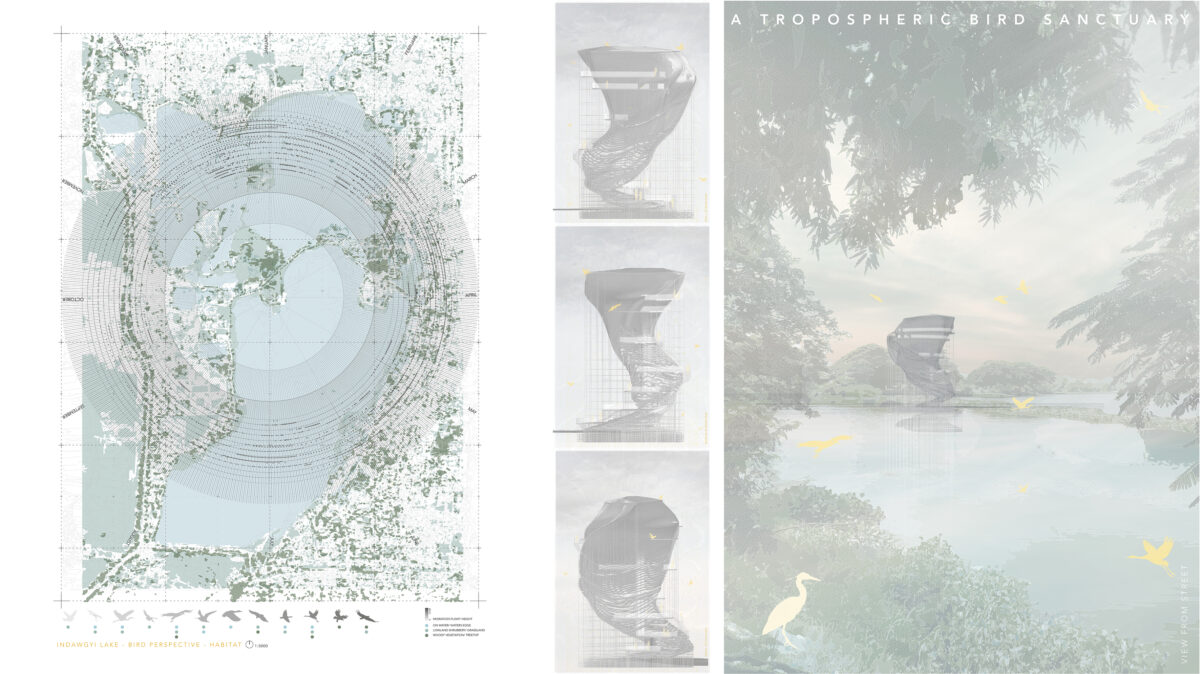
Rachel Wakelin: Avian Air – A Tropospheric Bird Sanctuary.
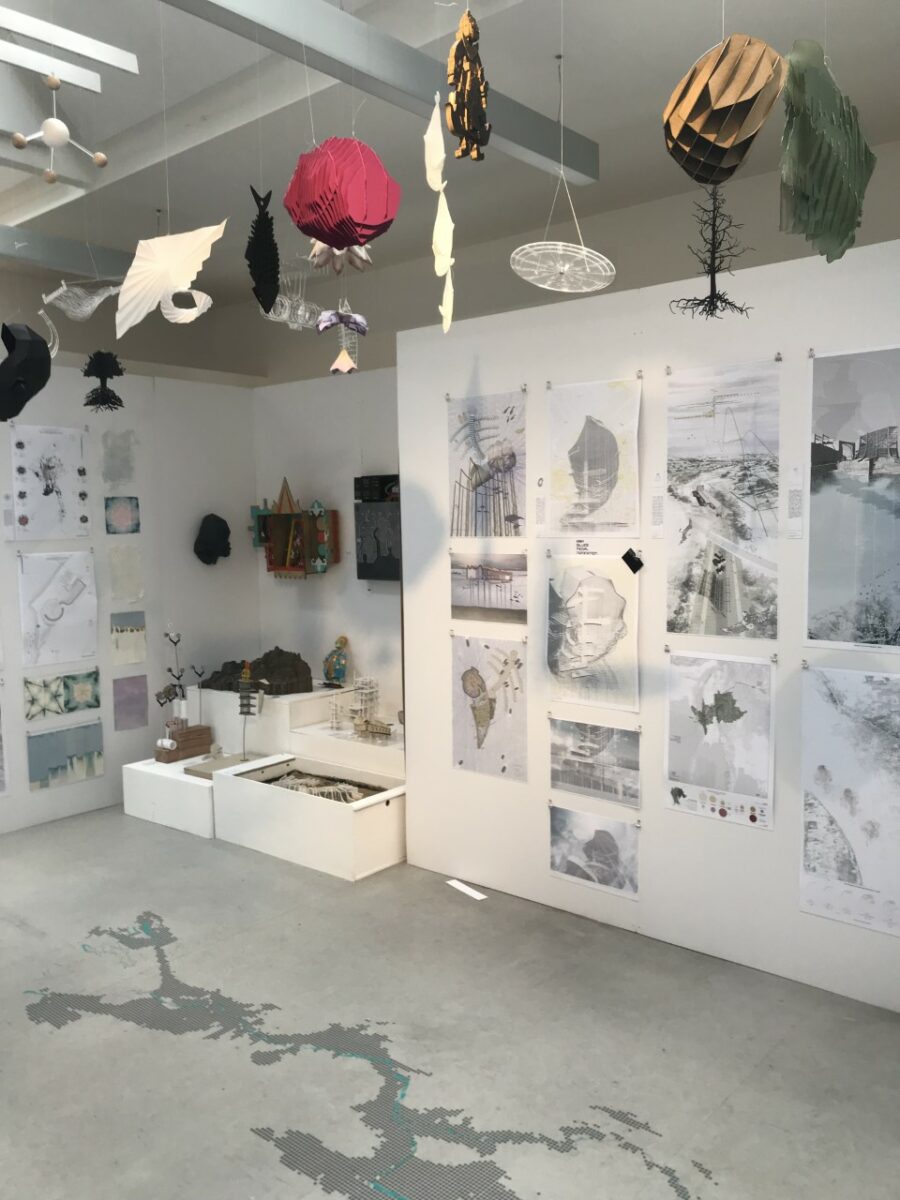
DS18 Myanmar OPEN Exhibition, June 2019.
2 Field Work
During September and October, Lindsay Bremner and Beth Cullen spent three weeks in Myanmar and one week in Bangladesh conducting field work. In Myanmar they spent time in Yangon, Bagan and Mandalay. They interviewed officials from planning and meteorology departments and met with a number of NGO’s and professional groups. They visited the New Yangon City Development site, a proposed development to extend the city to the west and journeyed south to Letkokkon on the Gulf of Martaban to visit a mangrove resuscitation project. Within the city, Beth conducted research into the back alleys and plastic and Lindsay was interested in the plant life on ruined colonial buildings. While in Yangon, high end shopping malls and upmarket condominiums, and their relationship to the jade economy began to assume importance for the project.
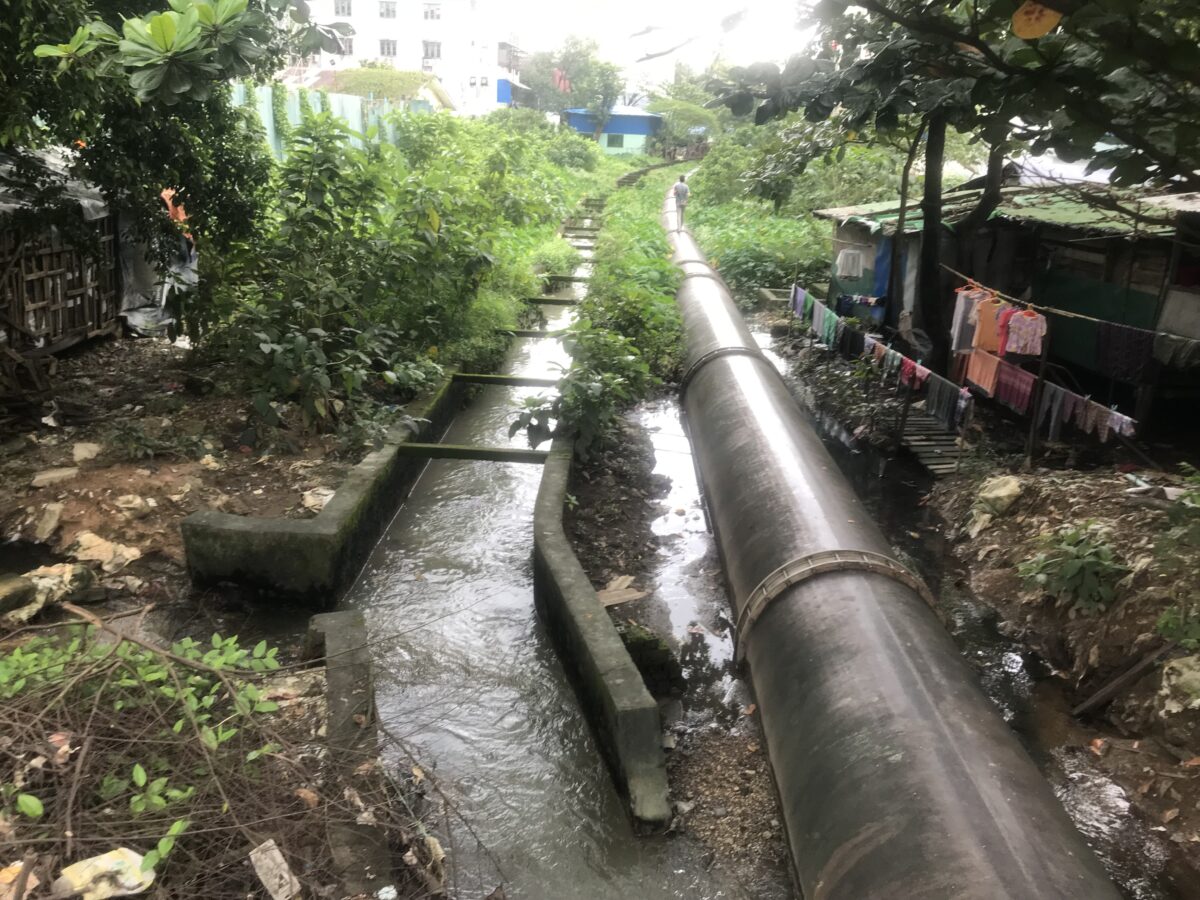
The Gyobyu pipeline, supplying water to Yangon.
While in Bagan, they took day trips to see the mud volcanoes at Minbu and climbed Mount Popa, one of Myanmar’s extinct volcanoes. In Mandalay they extended their research into jade and its exchange, spending a fascinating day at the jade market and visiting a newly constructed jade pagoda on the outskirts of the city.
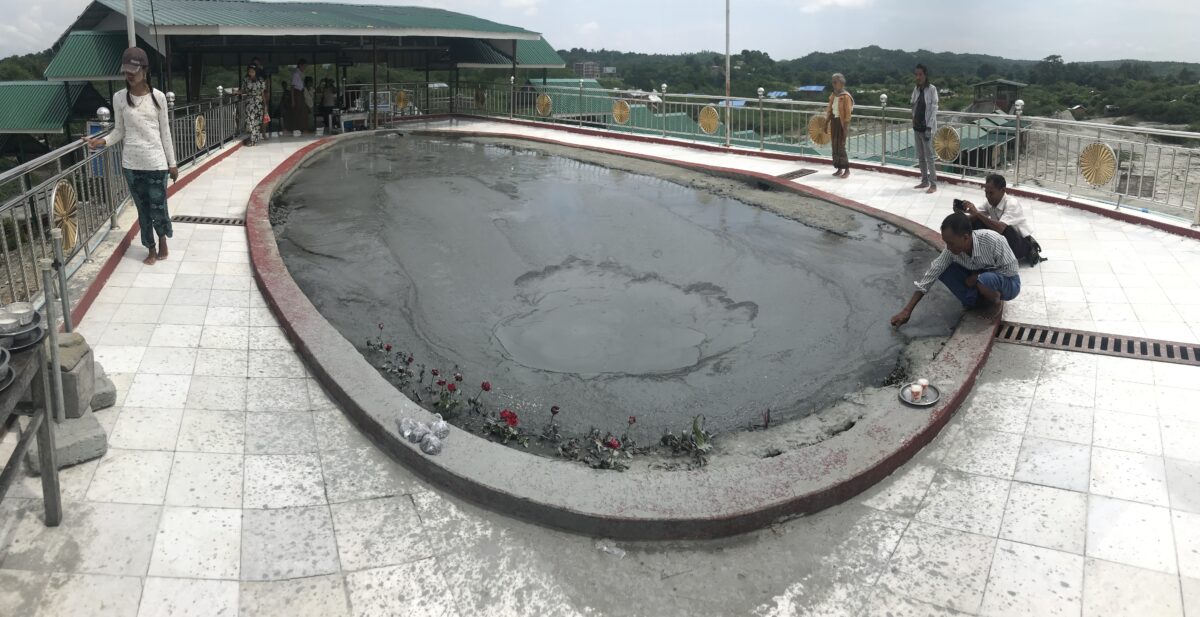
Minbu mud volcano.
They then flew to Dhaka in a small aeroplane at a low altitude, which gave incredible views of the delta.
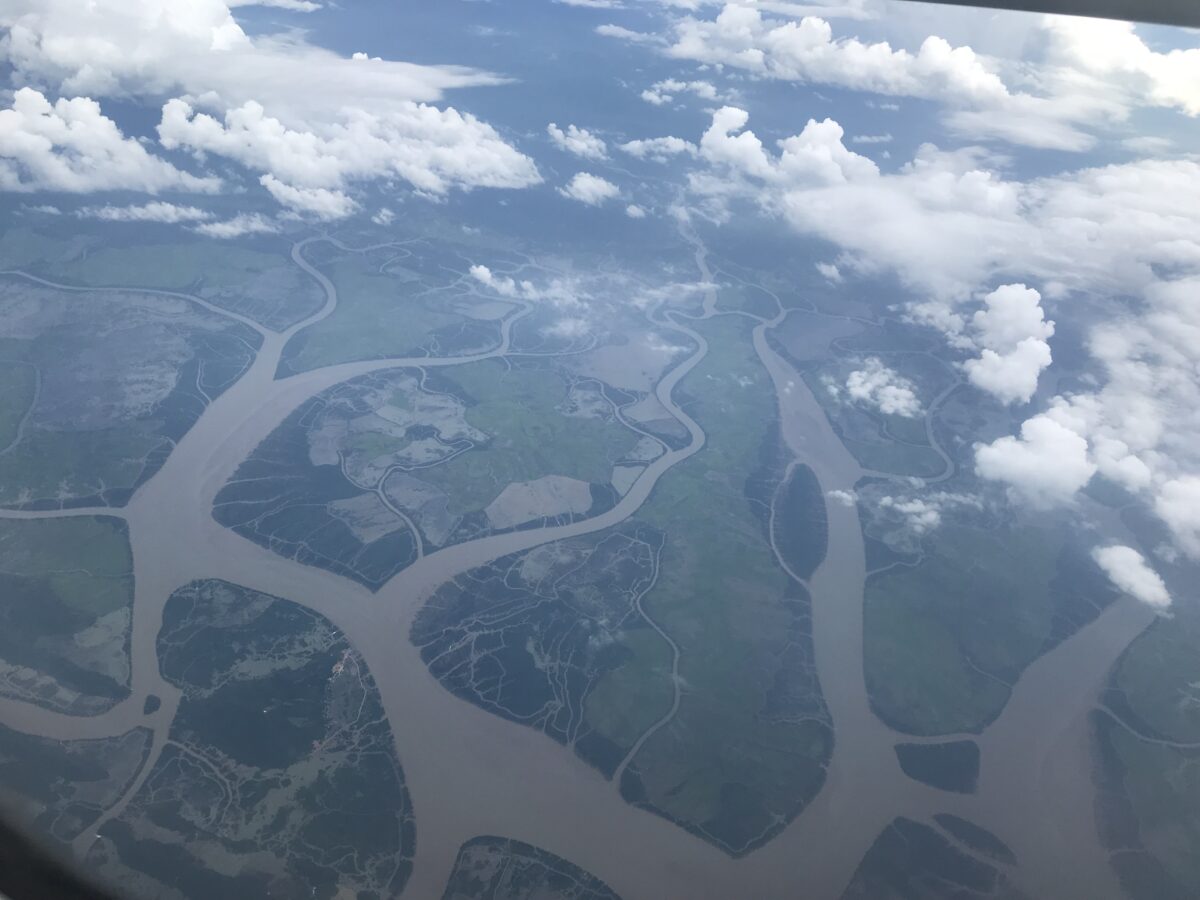
View of the Rhakine Delta.
In Dhaka they renewed contacts with the Bangaldesh Institute of Architecture, Landscapes and Settlements and the Bangladesh Research Initiative and spent time on Madani Avenue, visiting brickfields and interviewing a number of officials. It was a highly productive time and Lindsay and Beth would like to thank all who made themselves available to speak to them and facilitate the work. Harshavardhan Bhat also conducted his last period of PhD field work in July 2019, spending time in Delhi and Bangalore.
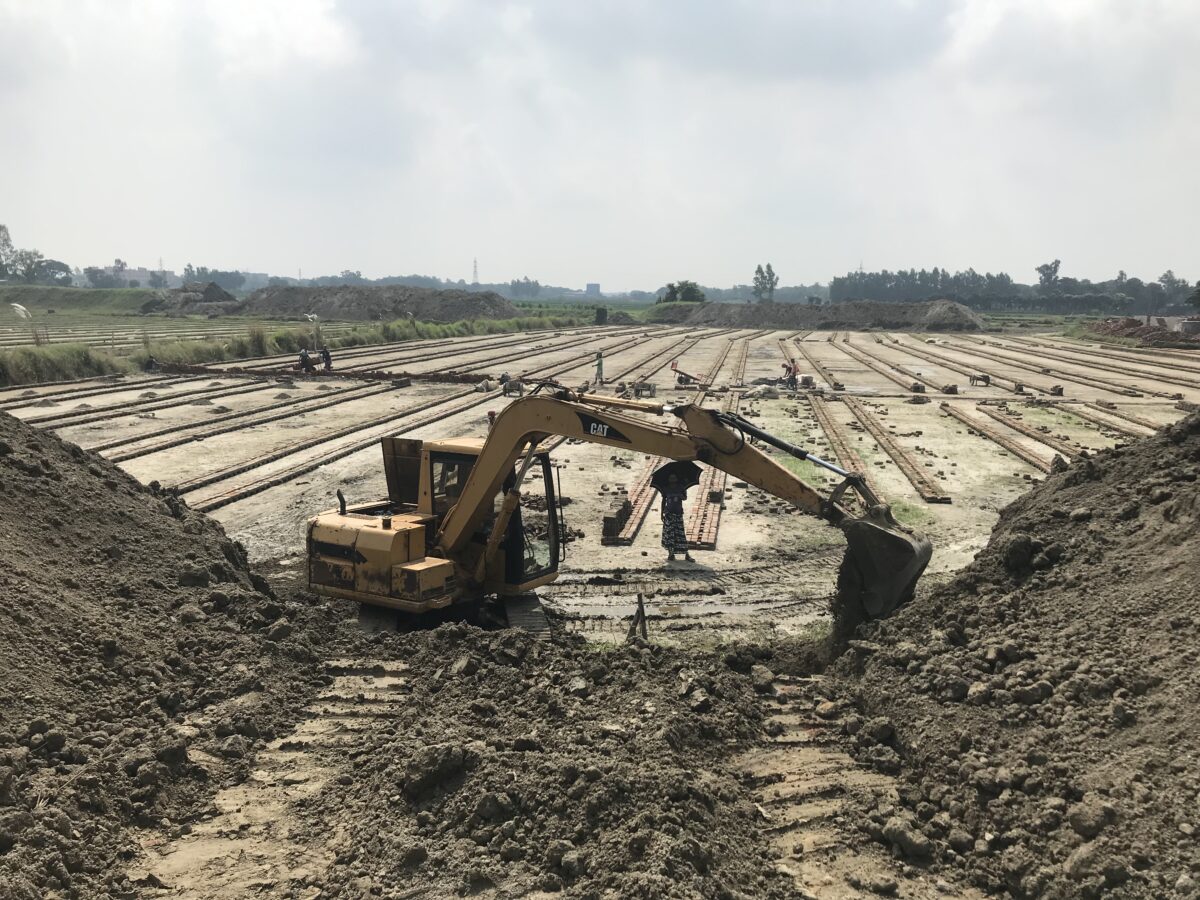
Brickfield on the outskirts of Dhaka.
3 Publications
This past year, our first two peer reviewed papers and a number of other published works came out:
Bremner, L. (2020). ‘Sedimentary logics and the Rohingya Refugee camps in Bangladesh.’ Political Geography 77. Online
Open Access here: https://doi.org/10.1016/j.polgeo.2019.102109
Bremner, L. (2019). ‘Planning the 2015 Chennai Floods.’ Environment and Planning E: Nature and Space. Online Open
Access here: https://doi.org/10.1177/2514848619880130
Bremner, L., Geros, C. and Cook, J. (2019). ‘Emergent and Erratic: Monsoonal Transmogrification of Land, Air and Sea.’ In
Antonelli, P. and Tannir, A. (eds.). Broken Nature, XXII Milan Triennale, 106-107. Milan: Electa.
Cullen, B. (2019). ‘Haunted Landscapes: Ghosts of Chennai Past, Present and Future Yet-to- Come.’’ In Bremner, L. (ed.).
Monsoon [+ other] Waters, 185-197. London: Monsoon Assemblages.
Bhat, H. (2019). ‘Malhar’ Theorising the Contemporary. Fieldsights, June 27 https://culanth.org/fieldsights/malhar
Bhat, H. (2019). ‘As I sit down to write a monsoon story without cloud bands – some mucus, confrontation and sadness.’
Hyphen Journal 1. http://www.hy-phen.space/journal/issue_1/
In addition, Lindsay Bremner has been invited to contribute an essay to Postcards from the Anthropocene: Unsettling the Geopolitics of Representation (eds.Tiago Torres Campos and Benek Cincik), Beth Cullen has contributed a chapter to Weather Mobilities (eds. Kaya Barry, Maria Borovnik and Tim Edensor) and Christina Geros a chapter to an edition of AD titled The Landscapists, Redefining Landscape Relations. (ed. Ed Wall). These will be published in 2020. Lindsay Bremner is also collating a forum (special issue) of the peer reviewed journal, GeoHumanities. In addition to papers by MONASS, contributions from participants at our annual symposia have been invited to contribute to this. Most of these papers have now been submitted and are under review by the journal. We anticipate that the special issue will come out in 2021.
4 Exhibitions
MONASS was invited to contribute to the XXII Milan Triennale, Broken Nature, March – September 2019 with four drawings by Christina Geros and John Cook. Following this, we have been invited to contribute to the Venice Architecture Biennale in 2020 and have proposed a site specific installation for that show. It will be developed in collaboration with Office of Experiments, the art practice of Neal White of the Westminster School of Arts. It will run from May – December 2020 in the Giardini in Venice.
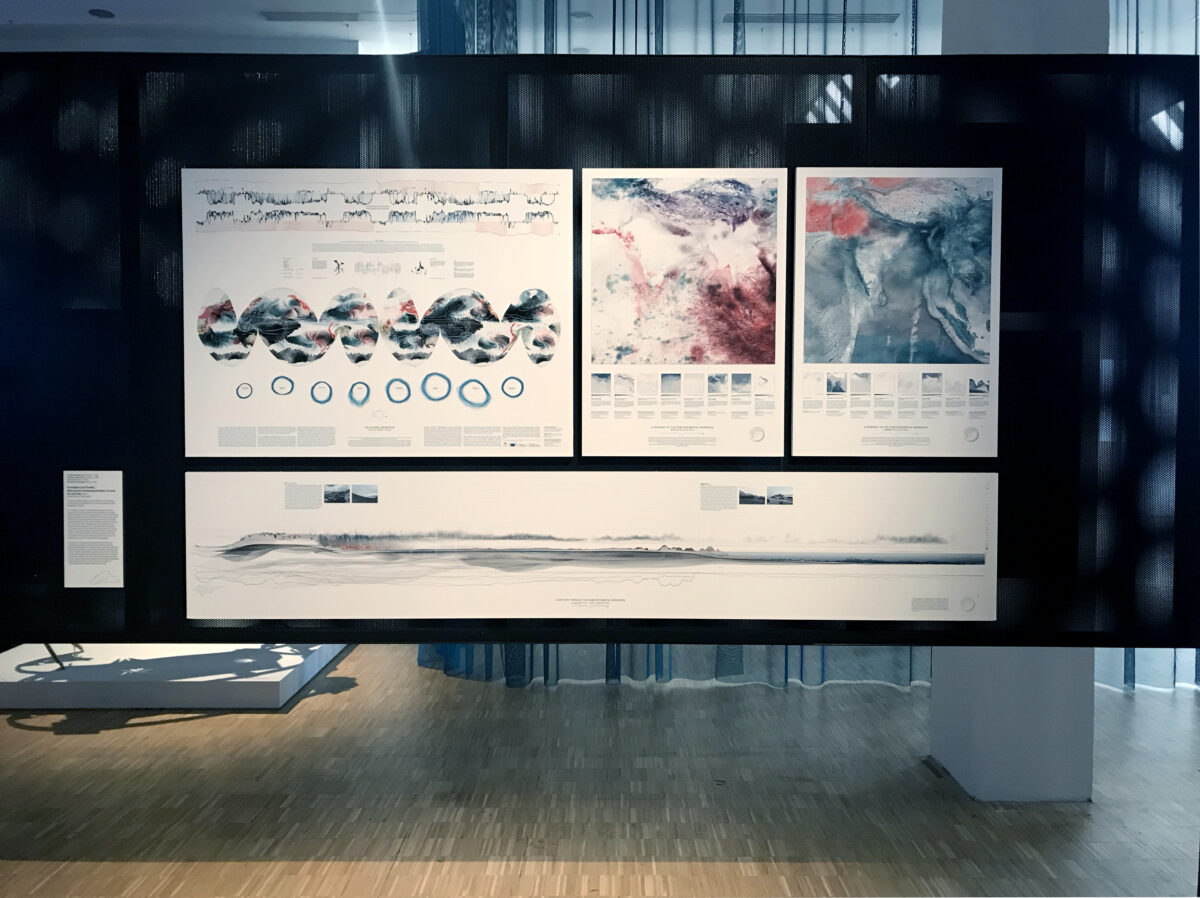
MONASS at the XXII Milan Trienale, Broken Nature, March – September 2019. Photograph: John Cook.
5 Additional Funding Applications
Lindsay Bremner put in a Proof of Concept Grant application to the ERC in early 2019 for impact activities in Chennai, Dhaka and Yangon, but this application was not successful. However, a similar application has successful advanced to the second round of the University of Westminster’s Quinton Hogg Trust Fund for 2020. A successful application to the University’s Community Research Fund resulted in £5,000 being awarded to support our Venice Architecture Biennale installation. An application has been made to the Graham Foundation for additional funding for the MONASS book and in 2020 additional funding for our final exhibition will be sought from Arts Council England.
6 Lectures and Presentations
Bremner, L.
‘On Monsoon as Method.’ Urban Studies Seminar Series, University of Glasgow, 05 December.
Invited Participant, Delta and River Cities Workshop, World Projects and Center for Resilient Cities and Landscapes, Columbia University, New York, 22 – 23 November.
‘On Monsoon as Method.’ Tyler School of Art and Architecture, Temple University, Philadelphia, 20 November.
‘On Monsoon as Method.’ Wits Institute of Social and Economic Research, University of the Witwatersrand, Johannesburg, 29 October.
‘On Sediment as Method.’ At: Monsoon [+ other] Grounds Symposium, University of Westminster, 21 – 22 March.
Cullen, B.
‘Haunted hydrological landscapes: Ghosts of Chennai past, present and future yet-to-come.’ At: Royal Geographical Society (RGS-IBG) Annual International Conference, London, 27 – 30 August.
‘Introducing Monsoon Assemblages.’ At: Participatory Steering of Complex Adaptive Systems Workshop, Synthesis Center, Arizona State University, 23 – 26 April.
‘Bangla Bricks: Making and unmaking monsoon grounds.’ At: Monsoon [+ other] Grounds Symposium, University of Westminster, 21 – 22 March.
Geros, C.
‘Here be Dragons: Grounds and Groundings of our Atmospheric Belonging.’ At: Monsoon [+ other] Grounds Symposium, University of Westminster, 21 – 22 March.
Bhat, H.
‘Acknowledging the Monsoon.’ At: Imagining the Eco-social postgraduate workshop with Jane Bennett and William Connolly, Cardiff University, 10 – 11 December.
Bhat, H. and Zehner, B. ‘Cyclones and the Monsoon’ At: HAT Research Center, Adam Mickiewicz University in Poznan, 15 November.
Bhat, H. in conversation with Tamlit, A’On Grow Heathrow’ At: Politics of Air – Air Matters Symposium, Watermans Art Centre, 9 November.
‘Methodologies within the Monsoon.’ At: Millennium Conference – Extraction, expropriation, erasure? Knowledge production in International Relations, London, 19-20 October.
‘Circulating stories of the air.’ At: Royal Geographical Society (RGS-IBG) Annual International Conference, London, 27 – 30 August.
‘Notes on a Monsoon Air Methodology.’ At: OP Jindal Global University, Sonipat, 02 August.
‘Notes on a Monsoon Air Methodology.’ At: Centre for Policy Research, Delhi, 18 July.
‘The Monsoon as a Political Air.’ At: Resilience and Hope in a World in Relation – European Workshop on International Relations, Krakow, 26 – 29 June.
‘Entanglements of the kikar and the dust storm.’ At: Urban Climates: Power, Development and Environment in South Asia Symposium, University of Cambridge, 07 – 08 June.
‘Fieldwork/Stickiness.’ At: Hyphen Symposium, P3 Ambika, University of Westminster, London, 24 March.
‘About a Monsoon Forest.’ At: Monsoon [+ other] Grounds Symposium, University of Westminster, 21 – 22 March.
Powis, A.
‘The materiality of Groundwater in the Chennai rainwater harvesting programme II.’ At: Urban Climates: Power, Development and Environment in South Asia Symposium, University of Cambridge, 07 – 08 June.
‘The Materiality of Groundwater in the Chennai rainwater harvesting programme I.’ At American Association of Geographers Conference (AAG), Washington DC, 03 – 07 April.
‘The Materiality of Groundwater: leaking, Seeping, Swelling, Cracking.’ At: Monsoon [+ other] Grounds Symposium, University of Westminster, 21 – 22 March.
Cook, J.
‘Air, Architecture + Other Climates, Investigating and Drawing with Data.’ AHO The Oslo School of Architecture and Design, 15 November.
‘Monsoon Assemblages: Chennai.’ At: Norwegian Institute for Air Research (NILU), 14 November.
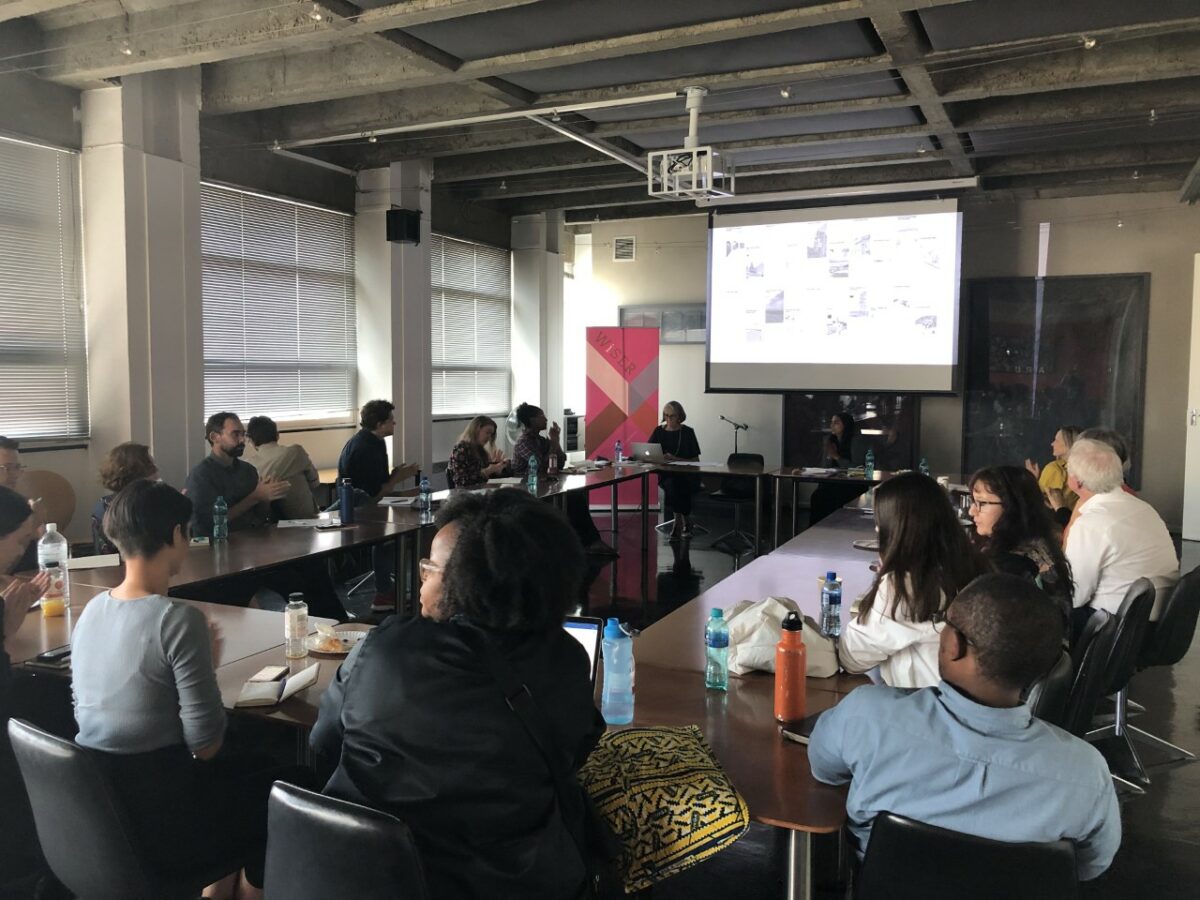
Lindsay Bremner at the Wits Institute of Social and Economic Research, University of the Witwatersrand, Johannesburg. Photograph: Steven Lenahan.
7 Looking ahead
2020 will be an extremely busy year for the MONASS team. We are now committed to an installation at the Venice Architecture Biennale, which opens on 21 May 2020, and to deliver our book manuscript to the publisher at the end of July. During the second half of the year, we will conduct stakeholder workshops in Chennai, Dhaka and Yangon, which will include exhibitions and and design charettes. These may involve interdisciplinary groups of students from the University of Westminster and each of these cities. The announcement and call for papers for our final conference, which will take place at the University of Westminster in March 2021 to coincide with an exhibition in P3 will go out in January 2020. Our two PhD students plan to submit their PhD’s by mid 2020 and will then be involved in assisting with planning our final conference.
We will not hold an advisory board in 2020, but will hold a concluding advisory board meeting as part of our wrap up events in March 2021. We wish you all a good break over the holiday period and a productive and fulfilling 2020.
All photographs by Lindsay Bremner unless otherwise indicated.
